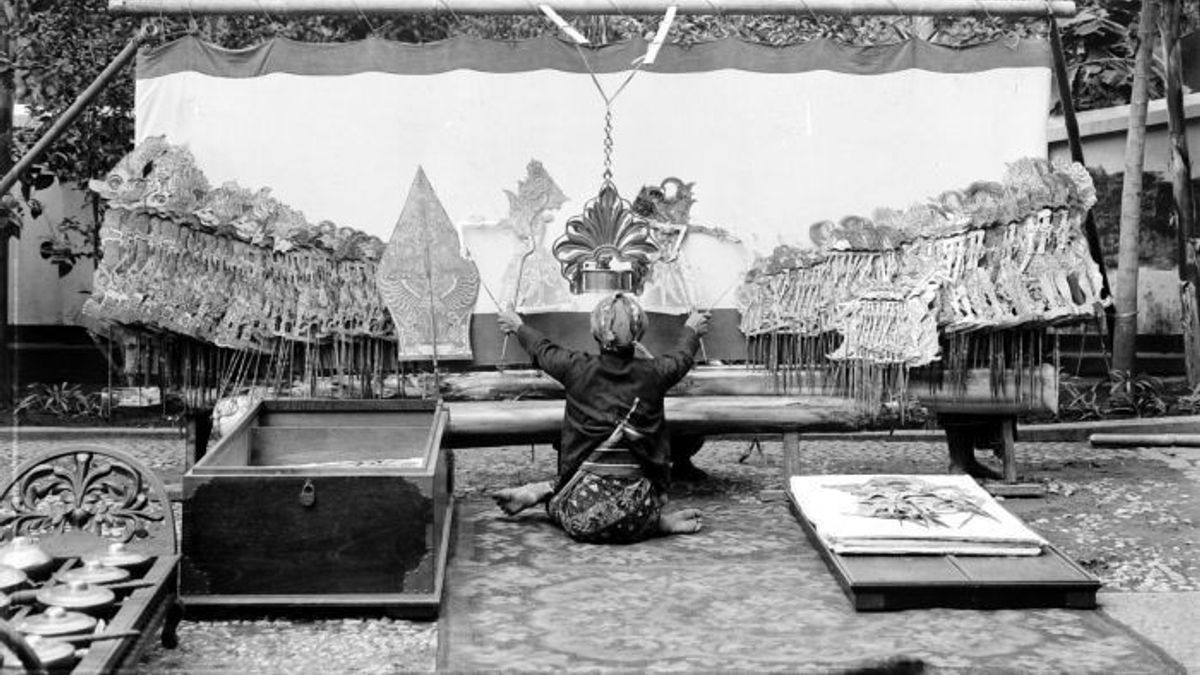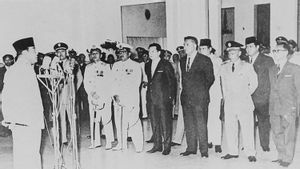JAKARTA - The role of the dalang (puppeteer) in wayang kulit (shadow puppet) performances is vital. His figure is like a wizard. They are spearheading the success of a puppet show. It sums up everything. From concocting stories and even holding or controlling the rain. Therefore, the extra task for the dalang is also known as the rain shaman. The dalang's skills are not only used during performances, but also for other big celebration events: births, marriages, circumcisions, and deaths.
Wayang kulit is a great masterpiece belonging to the ancestors of the bumiputras. Puppets are like a symbol of the progress of civilization. In a sense, the ancestors of the Indonesian people have known cultural values since time immemorial. That is why the Dutch scientist, Jan Laurens Andries Brandes (1857-1905) revealed that wayang as an element of the original culture of Nusantara had existed long before the arrival of Hindu-Buddhist influences.
After that, the art of wayang developed rapidly. Hindu stories began to be adopted. The results of this acculturation formed many Hindu and Javanese characters in the wayang world. Among others, Semar, Bagong, Gareng, Petruk, Bilung, and others.
There is a vital role of a dalang behind it. His expertise is not only about being able to tell stories and move puppets well. But a dalang must have the ability to revive the spirit of each character played. Thanks to that, the dalang is considered a character who is able to connect between humans and invisible forces.

In simple words: a dalang must be powerful and supernatural. Because, he is described as the center of the world of puppets. He has absolute power or someone who rules everything. Sometimes a puppeteer is described as like God. Sometimes like a king too. Although that assumption is debatable. However, above all, the dalang profession cannot be entered by just anyone. After all, only the chosen people can be the dalang.
“Sunan Bonang seems to think that humans and God cannot be separated, but they are also not singular and the same. Sufi thinkers in Java have expressed this idea through various parables. One of them is wayang kulit: God is the dalang, and humans are the wayang (and layar kelir or colored screen, is the mundane or cosmic setting). Wayang (puppet) and dalang (puppeteer) are different, but have a kind of unity, because in a wayang kulit show, wayang and dalang are inseparable and cannot exist without the other.”
“There is also a mirror metaphor which depicts humans as the image of God on earth. The person in the mirror and his image in the mirror are separate, but again, the one cannot exist without the other. So, with these two metaphors, the duality of the second nature can be maintained, but at the same time it acknowledges the existence of a kind of monism, or oneness," said the expert on modern Javanese literature, George Quinn in the book Wali Berandal Tanah Jawa (2021).
Dalang as a Rain Shaman
The magic of the dalang began to be widely known by the public since time immemorial. Even the magic is not only used or intended when he was just performing. The general public also often takes advantage of their services when there are relatives who hold celebrations in the form of celebration of life rites: birth, marriage, circumcision, and death. The dalang was asked to be a rain shaman. To keep out the rain, they thought.
The dalang also played his role as a rain shaman well. The celebration that brings the dalang as a rain shaman is actually able to hold or move the rain. This success makes the dalang profession have a greater value than labor.
In the 1920s alone, the wages of workers working a day were only 0.10 guilders. While the dalang earns wages for a day's performances of up to 10 guilders. It is said that during the Great Depression (1929-1939) the wages of a dalang as a rain shaman continued to increase. The advantage is none other than the dalang has the same privileges as a shaman.

“Mantras are sacred and should not be recited by everyone. Therefore, only certain people, such as the dalang, rain shaman, and mystical practitioner or a psychic have the right to say it. The chanting of the mantra is carried out in a sacred manner complete with ubarámpe offerings called sandhingan (Javanese).”
"This is done because the words spoken have the aim of being able to suggest magical powers. Meanwhile, the presented sandhingan has a magical power in people's lives," explained Asri Sundari in the book Sastra Rempah (2021).
In order to maintain his supernatural powers, mystical practices are carried out in various ways. Different dalang, different rituals performed. All of this is done so that the dalang, who is often considered an intermediary, can reach a high level of concentration so that he can attain powers that cannot be explained scientifically. Especially science.
VOIR éGALEMENT:
The role of the dalang is also confirmed by a Javanese Literature Master, G.A.J. Hazeu. He also revealed that the magic of the dalang was not only limited to being a rain shaman. In the practice of life, the dalang is also called for other purposes such as to lead the ruwatan ceremony (ward off misfortune).
"Not only as a rain shaman. If we trace the ruwat ceremony, colloquially called ngruwat, ruwatan, the dalang has many abilities to create salvation for the Javanese people.”
“For example, ruwat related to agriculture, the dalang can perform ceremonies to ward off plant pests. It could be to ward off disease and prevent crop failure," concluded Donny Puguh Prasetyo in his article in Adiluhung Magazine entitled Pandhawa Cinarita: Keris Ageman Para Dalang (2021).
*Read other information about TODAY'S HISTORY or read other interesting articles from Detha Arya Tifada.
The English, Chinese, Japanese, Arabic, and French versions are automatically generated by the AI. So there may still be inaccuracies in translating, please always see Indonesian as our main language. (system supported by DigitalSiber.id)


















